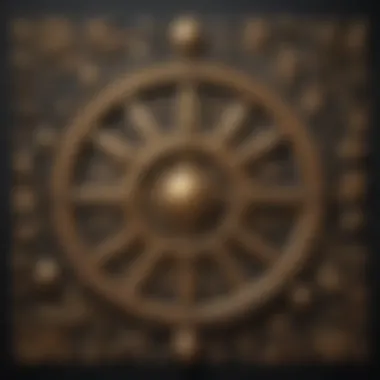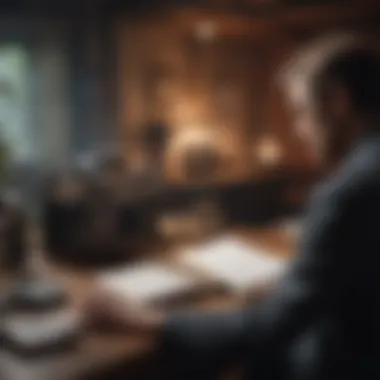Exploring the Concept of 'Deus' in Literature and Philosophy


Intro
The concept of 'Deus' holds profound significance in both literature and philosophy, beckoning readers to delve into its rich implications. Identified primarily as a reference to a god or divine figure, its interpretations extend far beyond simple definitions. Historical roots, the evolution of cultural understanding, and the intricate layers of its use in various narratives reflect the complexity of how humanity has conceived the divine. This article seeks to unravel these layers, presenting a detailed examination of 'Deus' across genres and epochs.
From ancient texts to modern discourse, we shall discuss how this pivotal term shapes themes and moral frameworks within stories. The inquiry into 'Deus' allows readers to contemplate not only literary and philosophical representations of the divine. It also prompts critical reflection on its impact on societal structures and individual thought. Consequently, the exploration of 'Deus' frames our understanding of belief, morality, and creativity.
As we move further into this topic, insights will be drawn from historical texts, cross-cultural perspectives, and contemporary literary discussions. This blend seeks to paint a comprehensive picture of how 'Deus' influences narratives, echoing through timelines and ideologies that define human experience.
This section endeavors to set the stage on understanding the salient aspects of 'Deus.' Here we outline elements that will guide us through the analysis ahead, ultimately allowing a deeper and multifaceted comprehension of the divine's portrayal.
- The etymological origins of 'Deus.'
- Historical relevance and cross-cultural interpretations.
- Thematic representations in various forms of literature.
- Philosophical ramifications and moral implications of believing in a deity.
- Modern implications in discussions about faith and denial.
"The quest for understanding 'Deus' is more than an inquiry into the divine; it is an exploration of the depths of human thought and the principles that govern our lives."
Understanding the Term 'Deus'
Grasping the concept of 'Deus' is crucial for navigating both literature and philosophy. It's an inquiry that opens discussions about existence, ultimate reality, and the divine. The term surfaces in various cultural discourses, making its importance multifaceted.
Literature often serves as a reflection of philosophical ideas and themes. Understanding 'Deus' hints at the writer's role in answering philosophical questions within constructed narratives. This entails examining how illustrious thinkers embodied concepts of divinity and existence in the text.
Etymology and Origin
The etymology of 'Deus' originates from Latin, meaning “god” or “deity.” This root connects with ancient Roman doctrines and practices, tapping into the fundamental inquiries surrounding god and the divine. The transliteration pathways show connections to various European languages, including 'Dieu' in French and 'Dios' in Spanish.
Such cultural linguistics highlight the pervasive influence of the idea of divinity. Observing these derivatives can demonstrate how both historical context and cultural interpretation are vital in evoking the broader concept of ‘deity.��’ It is through this lens that numerous interpretations arise.
Additionally, mention of manifestations of 'Deus' in texts from ancient to modern underscores historical philosophical discussions. Key works include references from philosophers like Plato, as well as theological doctrines that solidify or challenge notions of 'Deus'.
Historical Contexts
The historical contexts of 'Deus' illuminate evolving human thought. Ancient civilizations often perceived the divine as intertwined with their world view. For instance, Greeks worshipped numerous gods, each representing various facets of life and nature. Contrastingly, Judeo-Christian religions brought a unifying vision of the divine, shaping much of Western thought.
During key historical moments, such as the Enlightenment, thinkers like Kant and Descartes endeavored to redefine 'Deus', proposing more personal engagements with spirituality and the divine framework beyond organized religion.
Furthermore, the ways in which revolutions and societal changes impacted perception towards 'Deus' showcase humanity's shift from collective belief to individual exploration. This complexity enriches dialogues across literary platforms. Challenging thoughts on the divine might parallel shifts in societal consciousness.
Philosophical Perspectives on 'Deus'
The study of philosophical perspectives on 'Deus' plays a crucial role in understanding the broader implications of the divine in human thought. Philosophers have often engaged with the concept of 'Deus' to address essential questions about existence, morality, and the nature of reality. This discourse is significant, as it does not merely address abstract ideas but also speaks to the lived experiences of individuals who partake in these intellectual pursuits. By dissecting philosophical frameworks, one can appreciate how 'Deus' emerges as a central theme in debates about meaning, purpose, and moral obligation.
Existentialism and the Divine
Existentialism presents a viewpoint that interrogates the existence of 'Deus' through a lens of individual freedom and responsibility. This philosophical perspective confronts the seemingly indifferent universe. Existentialists contend that if God does not exist, individuals must create their own meaning. This challenge affects how we perceive our existence and relationships with others. Existentialists like Jean-Paul Sartre and Simone de Beauvoir emphasized the absence of a divine order that dictates values or purpose. Instead, they advocate for authentic living, urging individuals to accept responsibility for their life decisions. It is within this realm of existential thought that 'Deus' takes on a more symbolic and abstract quality, often becoming a representation of human struggles and aspirations.
Deism and Its Influences


Deism posits that 'Deus' can be understood as a higher power that does not intervene directly in the world. This belief system gained traction during the Enlightenment and favored reason and observation of the natural world. Deists argue that the existence of a creator can be discerned through the laws of nature and the applications of logic.
Insights into Deism reveal several key influences on modern thought:
- Reaction against Dogma: Deism arose partly as a rejection of traditional religious dogmas that were often seen as restrictive or unfounded.
- Natural Theology: This concept emphasizes understanding 'Deus' through the study of nature and the universe. Deists argue that everything can be cataloged by its inherent laws, giving rise to debates between faith and scientific rationale.
- Impact on Political Systems: Many Enlightenment thinkers incorporated Deistic principles into their views on governance, advocating for rational thought and separation of church and state.
Literary Representations of 'Deus'
Literary representations of 'Deus' provide profound insights into how this concept is perceived across different times and cultures. This exploration reveals broader themes and ethical questions regarding life, existence, and the human condition. Often, the character or idea of 'Deus' acts as a catalyst for deeper philosophical inquiry. Understanding these representations exposes the intertwining of literary creativity and philosophical thought.
Theological Themes in Classic Literature
Classic literature frequently portrays 'Deus' within the framework of theological themes. Authors such as Dante Alighieri and John Milton grappled with the nature of divinity in their works. In Dante's Divine Comedy, the representation of God reflects Christian belief systems. It serves as a means to explore moral accountability and redemption. Through such depictions, we see characters confronting their vices while seeking forgiveness and enlightenment.
Similarly, in Milton's Paradise Lost, the conflict between divine sovereignty and free will is a central theme. The portrayal of God in this epic serves as a touchstone for examining rebellion and disobedience. The nuanced portrayals in these classics invite readers to question—what is the role of 'Deus' in shaping ethical frameworks?
Determining the impact of these theological themes assists readers to comprehend moral responsibilities attributed to divinity.
Modern Interpretations in Contemporary Works
The interpretation of 'Deus' has evolved, especially in contemporary literature. Writers frequently revisit traditional concepts, contextualizing them within modern dilemmas. For instance, in works like The Alchemist by Paulo Coelho, the notion of a personal, guiding force challenges the more detached conception of God found in earlier texts. Through this story, Coelho explores individuality and personal destiny, suggesting a more relational understanding of the divine.
On the other hand, books such as Cloud Atlas by David Mitchell present a fragmented understanding of divinity. The narrative style reflects the complexities and contradictions of belief in a rapidly changing world. Mitchel’s interpretation of fate challenges the absolutes inherent in traditional religious narratives.
In modern works, the theme of 'Deus' intertwines with existential concerns. Authors dive into the implications of cosmic indifference and human resilience, providing a broader cultural and philosophical lens. Thus, modern interpretations of 'Deus' reflect the continuous dialogue between faith, doubt, and human emotion, pressing readers to consider their own beliefs and assumptions.
“Understanding 'Deus' within literature invites a reflection of moral choices that resonate with changing societal values and questions of existence.”
Cultural Interpretations of 'Deus'
The cultural interpretations of 'Deus' reflect humanity's attempts to understand the divine relative to diverse belief systems and their respective values. This analysis provides insights not only into the nature of God but also to how different societies shape, and are shaped by, their understanding of the divine.
Comparative Analysis of Religions
In different religions, the concept of 'Deus' takes on unique meanings, each defined by its foundational texts, traditions, and moral teachings. Both monotheistic and polytheistic views reveal disparities and similarities that highlight deeper cultural values.
- Monotheism: In faiths like Christianity, Judaism, and Islam, ‘Deus’ represents a singular omnipotent deity. These religions emphasize worship, obedience, and moral lives guided by divine commandments. The narratives often reflect a personal relationship between believers and 'Deus,' leading to existential questions about faith and doubt.
- Polytheism: In Hinduism and ancient Greek religions, 'Deus' is more widely parsed into multiple deities, each governing different aspects of life and nature. These representations are varied, as each god embodies specific attributes, allowing followers to address different human experiences. Religious practices often center on rituals aimed at pleasing these deities, depicting a dynamic divine interaction.
Understanding these perspectives fosters a respectful dialogue that catalyzes interfaith conversations. Each interpretation influences aesthetics, family dynamics, and broader societal behavior.
Cultural Narratives and the Divine
Cultural narratives shape and support the societal understanding of 'Deus' in profound ways. Various stories, myths, and literature highlight overarching themes concerning divinity.
For instance, the biblical tale of creation contrasts sharply with creation myths found in indigenous cultures. Certain Native American myths demonstrate nature’s divine character, placing 'Deus' as an element of the ecosystem rather than a separate entity.
These narratives serve multiple functional roles within societies:


- Moral Framework: They teach ethical conduct and instill values, guiding societal norms.
- Cohesion: They strengthen group identity and cultural heritage through shared beliefs.
- Interpretation of Existence: They help individuals grapple with complex questions of existence and morality.
As societies evolve, these stories adapt, reflecting changing values and understandings of existence. This continual evolution stresses the importance of cultural context, shaping what 'Deus' means to different groups in varied periods.
'The search for 'Deus' in human culture is a melding of narrative, experience, and interpretation, illuminating the depth of human degradation to understand the infinite.'
By examining the cultural interpretations of 'Deus,' we appreciate the plurality of ways in which humankind seeks understanding and connection with the divine.
The Role of 'Deus' in Morality
The discussion surrounding the role of 'Deus' in morality is profound and essential within the broader scope of this article. Morality often looks towards a higher authority for guidance, and the concept of 'Deus' serves as that authority for many belief systems. Examining how 'Deus' influences moral frameworks opens up dialogue on not only ethical standards but also on the underlying philosophical tenets that drive human behavior, societies, and laws.
Moral Philosophy and Divine Command Theory
Divine Command Theory posits that moral obligations arise from God's commands, framing ethical considerations in relation to the existence of 'Deus'. According to this view, what is morally right or wrong stems directly from divine will. Thus, morality does not exist independently of religious belief or divine authority.
This theory raises interesting questions: Are actions inherently good because they are decreed by 'Deus', or are they good in their own right? Critics argue this can lead to moral subjective choices, limited by cultural contexts or the interpretation of divine instructions. Nevertheless, this perspective provides a framework for understanding how many seek moral clarity through faith and conviction.
Key aspects of Divine Command Theory include:
- Authority: The belief that God's commands set absolute moral standards.
- Objectivity: Provides a universal guideline for morality based on the divine will.
- Accountability: Indicates that individuals are answerable for their actions in accordance with divine scripture.
Secular Ethics and the Concept of God
While Divine Command Theory ties morality closely to the concept of 'Deus', secular ethics seeks to establish moral codes independently of religious frameworks. Proponents of secular ethics argue that moral principles can arise from human reason, experiences, and social contracts. Here, the axis shifts from the divine to humanistic concerns.
From a secular standpoint, 'Deus' may hold less immediate relevance in moral deliberation. However, the question of how to integrate the idea of 'Deus' with community welfare and ethical philosophies continues to provoke discussion.
Key considerations in secular ethics include:
- Moral relativism: Recognizes the variation of moral standards across cultures without divine endorsement.
- Utilitarianism: Advocates for the greatest good for the greatest number, abandoning divine implications.
- Humanism: Suggests that human values arise from empathy, reason, and self-interest rather than a divine construct.
“Morality arises not from God, but from our understanding of perspectives in the shared human condition.”
This evolution of thought delineates a progression from religious moral authority towards rational critique. As characters evolve and societies progress, perceptions about 'Deus' and morality may justifiably fluctuate, enriching the discourse surrounding ethical paradigms.
The Impact of 'Deus' on Society
Understanding the profound implications of 'Deus' is essential for comprehending its resonance in societal structures. The presence of the divine influences cultural coherence, moral frameworks, and shared values throughout history and in contemporary times. Given that 'Deus' is often associated with powers beyond humanity, viewing its impact through the lens of society reveals diverse dynamics at play.
Religion's Role in Social Structure
Religion has a foundational position in the formation of social structures. It establishes norms and ethical guidelines that govern behavior among community members. In many societies, various religious beliefs instill a sense of identity that unifies individuals, crafting a framework for society.
- Social Cohesion: At its core, religion fosters community. People rally around shared beliefs and practices which nurture ties among individuals, making society more cohesive.
- Moral Guidance: Religious teachings often function as a moral compass. Coded narratives articulate what is deemed right or wrong, subsequently influencing laws and regulations.
- Societal Hierarchies: Many religious structures give rise to particular social hierarchies, where clergy and faith leaders gain authoritative roles within communities. This allows for organized governance and collective decision-making informed by religious principles.
In connection to this, various foundational texts offer insight into the linkage between divine belief and social constructs. Works from thinkers like Emile Durkheim underline that societal solidarity frequently depends on collective religious experiences.


Historical Events Influenced by Religious Beliefs
Throughout history, religious beliefs have been pivotal in shaping key events that define societies. When examining the influence of 'Deus' from this perspective, we can note several significant incidents:
- The Crusades: This series of religious wars illustrates how faith can mobilize entire societies, leveraging divine justification to propel not just personal belief but large-scale agendas driven by a search for territory and security through religious mandates.
- The Protestant Reformation: Spearheaded by figures like Martin Luther, this movement shook the foundations of established faith, instigating a revolution in thought and leading to global religious reorganization, autonomy, and sociopolitical change.
- American Civil Rights Movement: Religious sentiment significantly supplemented this civil rights struggle, where leaders, inspired by faith, articulated visions of equality resonating deeply in both spiritual and moral realms.
These examples illustrate that religious concerns cannot be seen as separate from societal progress or conflict. Rather, they interweave with the fabric of human interactions. Therefore, the exploration of how 'Deus' extends beyond individuals to collective experiences becomes quite necessary for understanding its lasting societal impact.
Quote: “Religion is the backbone of society; guiding principles laid down by faith shape the social existence of a people.”
Contemporary Discussions on 'Deus'
Contemporary discussions on 'Deus' play a crucial role in understanding how this concept impacts current philosophical, cultural, and literary dialogues. In our rapidly changing world, the relevance of the divine is constantly reconsidered against modern ideals and scientifc discoveries. Many intellectuals grapple with ages-old questions about existence, meaning, and the nature of the universe. These discussions examine reasons behind reasons behind believers' and skeptics' stances alike.
Debates on the Existence of God
Debates surrouding the existence of God persist into modern times. The engaged dialogue often contrasts acute rational thought with deeply held spiritual beliefs. Prominent figures such as Richard Dawkins advocate for atheistic viewpoints, challenging traditional notions of a divine presence.
Counterarguments often arise from various theological perspectives. These viewpoints, including classical arguments such as the Cosmological Argument or the Teleological Argument, attempt to reinforce those belief structures. Specifically:
- The Cosmological Argument presents the case that everything must have a cause, culminating in a necessity of a first cause.
- The Teleological Argument suggests that the indications of design within the universe signify the existence of an intelligent designer.
Both sides provide a framework that benefits people engaging with theology, philosophy, and science, drawing definitions and conclusions that are essential for grasping current major theological discussions.
“The journey on these debates often leads one to a deeper self-exploration about beliefs and values.”
The Role of Science in Understanding the Divine
In this age, science significantly influences discussions around 'Deus'. Advances in fields like quantum physics and neuroscience introduce data that often appears contradictory to traditional religious foundations. Perspectives vary; some scholars maintain that science and faith are inherently unsynchronized.
Examples of modern discourse surrounding science and religion include:
- The examination of Darwin’s theory of evolution, which challenges creationist beliefs.
- Research on consciousness, asking profound questions about its origin and relation to the divine.
Despite the collisions between scientific discoveries and religious thought, a dimension of dialogue persists between both realms. Many individuals seek reconciliation, attempting to align religious beliefs with scientific knowledge, creating a discussion that prioritizes understanding over opposition.
This intersection encourages ethical discussions on our responsibility toward ourselves and the universe, focusing on the influence of spirituality in modern ethics.
Epilogue: The Pursuit of Knowledge and Understanding of 'Deus'
The concept of 'Deus' serves as a significant thread running through both literature and philosophy, influencing notions of morality, human existence, and societal structures. This article examined 'Deus' not just as a biblical notion but as a multifaceted ideal that has transformed various realms of human thought.
Understanding 'Deus' is essential due to its profound implications for both philosophy and literature. Analyzing how different cultures interpret the divine fosters a richer comprehension of human beliefs and ethics. Each philosophical perspective, whether it’s Deism or existentialism, presents unique insights that challenge us to contemplate the nature of existence and our moral obligations. Without reflection on these questions, our views on being and ethics would remain superficial.
Furthermore, literature often reflects the theological and existential dilemmas revolved around 'Deus.' From Shakespeare to modern authors, narratives often grapple with the dichotomy of faith and doubt, moral imperatives, and the search for meaning in an indifferent universe. This exploration helps to form bridges between writer and reader, creating deeper engagement with one’s personal beliefs.
The synthesized views of historical texts, contemporary discourses, and cultural narratives ultimately reveal how ‘Deus’ manifests in varying contexts. Considerations on the influence of religious beliefs on social structure highlighted some ways our concepts of the divine impact the everyday constructs of life.
In summary, the pursuit of understanding 'Deus' emerges as a multifaceted endeavor that shapes intellectual, moral, and societal landscapes. As readers and thinkers, engaging with these ideas remind us of the potential limitations of our perspectives. Thus, the conversation around ‘Deus’ must remain active and continuous, prompting ongoing reflection on humanity's complex journey in search of meaning.
“Philosophy and literature serve not just to confront the notion of 'Deus,' but to enliven our understanding of existence.”
By participating in this discourse, we extend our understanding of both the divine and our own humanity.







